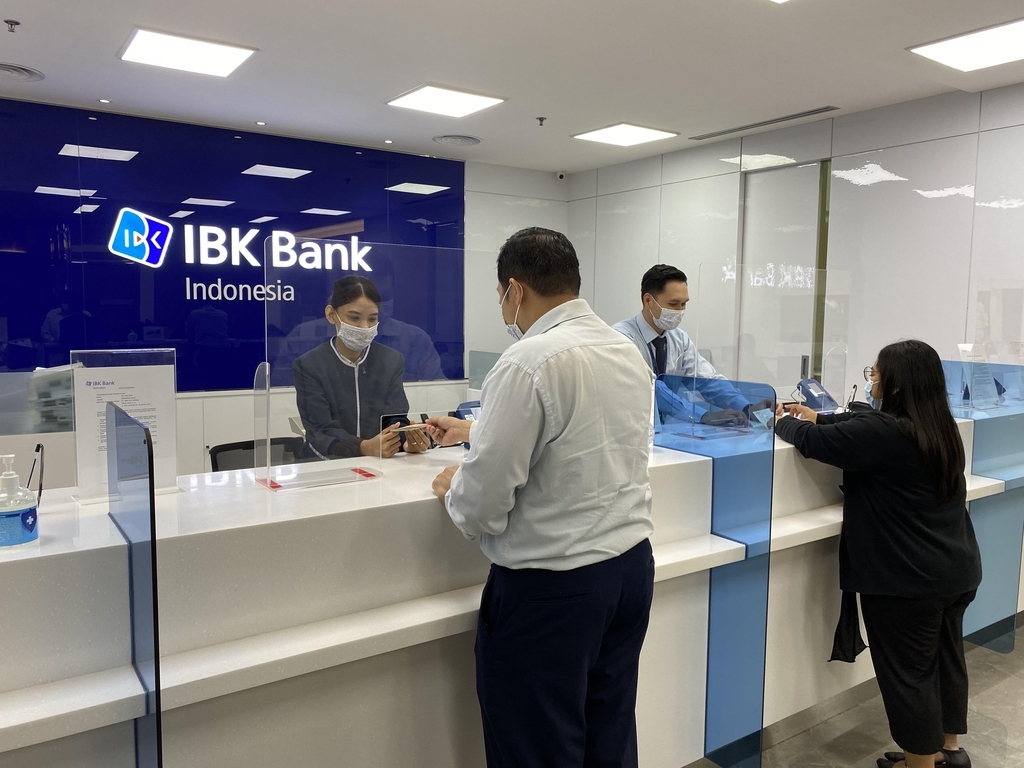 |
Customers talk to bank employees at a Bank IBK Indonesia branch. (Industrial Bank of Korea) |
The state-run Industrial Bank of Korea’s Indonesian subsidiary, its largest ASEAN business, fell deeper into the red in the second quarter, while its Korean rivals are raking in robust profits from their businesses there. Flagging warning signs for its annual performance this year, Bank IBK Indonesia reported a net loss of 14.3 billion won ($12.2 million), failing to extend its growth momentum gained in the first quarter of 1.2 billion won in net profit.
“In the early stages, net loss was due to investment in building infrastructures and creating a business environment in Indonesia,” an IBK official in Korea said.
“But then the COVID-19 pandemic hit and set up more hurdles for the business there,” the official added.
Unfortunately, staying in the red is nothing new for Bank IBK Indonesia, as it reported net losses pre-pandemic. A net loss of 18.2 billion won was reported in the last three months of 2019, after entering the market in September that year. The net loss then snowballed to an annual 39.4 billion won last year, when its already struggling business was hit by the COVID-19 global pandemic.
Indonesia has been IBK’s key destination for its overseas expansion. It said earlier that it plans to make 25 percent of its overseas profits from its Indonesian business by 2023 and expand the number of branches to 55. After acquiring the ASEAN nation’s Bank Agris and Bank Mitraniaga, IBK’s Indonesian unit currently operates 32 branches in the archipelago.
In the Southeast Asian country, other Korean lenders‘ first quarter net profits exceeded market expectations and their growth should continue for the second quarter, according to market observers.
Bank Woori Saudara, Woori Bank’s Indonesian unit, which the Korean lender owns some 80 percent stake in, has reported a net profit of some 10.6 billion won in the first three months of this year. It accounted for more than 30 percent of the Korean bank’s net profit made from its overseas business in the cited period, according to Woori. This was after reporting an annual profit of some 30 billion won last year.
Woori decided last month to invest an additional 110 billion won in its Indonesian unit via capital raise. Bank Woori Saudara was established in 2014, when Bank Woori Indonesia -- an Indonesian subsidiary of Woori Bank -- merged with the local lender Bank Saudara to make inroads into the Southeast Asian market. It currently operates 28 branches and 125 smaller brick-and-mortar locations.
Shinhan Bank’s Indonesia unit reported a net profit of 6.1 billion won for the first three months of this year, jumping 252.5 percent on-year. Hana Bank’s Indonesian subsidiary reported a net profit that had shed 75 percent on-year in the same period, but still reported a net profit of 7.1 billion won.
KB Kookmin Bank’s Indonesian subsidiary Bank Bukopin, on the other hand, reported a net loss of some 12.9 billion won in the cited period.
Woori, Shinhan and Hana have managed to report profits from their Indonesian businesses, despite the dire situation surrounding the pandemic in the country. Indonesia last week moved past Italy into 10th place for most fatalities from the pandemic with a death toll of 117,588. The banks have yet to announce the second quarter performance of their Indonesian units as of Monday.
Indonesia’s fast-growing economy and its population of 270 million has attracted Korean banks to enter and expand their businesses there in a short amount of time. All five major commercial banks, except NH NongHyup, are currently operating in the market.
By Jung Min-kyung (
mkjung@heraldcorp.com)








![[Weekender] Korea's traditional sauce culture gains global recognition](http://res.heraldm.com/phpwas/restmb_idxmake.php?idx=644&simg=/content/image/2024/11/21/20241121050153_0.jpg)